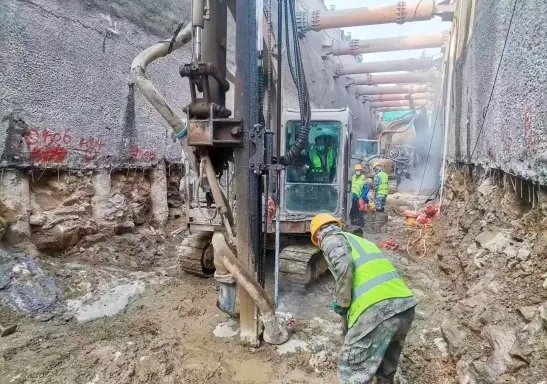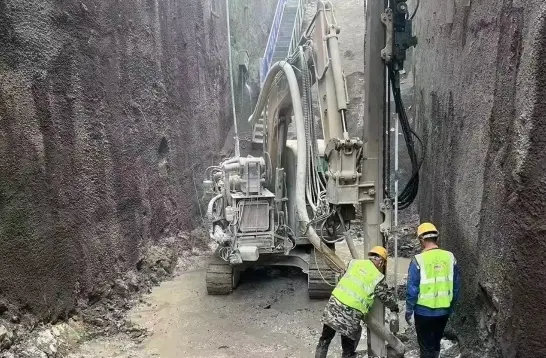Time:2024-05-27 Browse: 1252
Due to the impact of the demolition of Qingdao First Dairy Farm, the construction of the entrance and exit of Xijing Station on Qingdao Metro Line 9, undertaken by China Railway 20th Bureau Fourth Company, will be carried out in advance. However, as soon as the excavation of the foundation pit was carried out at the entrance and exit, the problem of hard rock excavation was encountered.
Deadly problem, the hardest rock+the most complex construction environment
"Very hard! Digging more than 3 meters down is the rock layer, and some rocks have a compressive strength of up to 148 megapascals. This compressive strength is equivalent to over 1 ton of weight being pressed on a nail cap," said Jiang Xiaowei, the project manager of Xijing Station, with a bitter smile.
The volcanic rock layers of the Cretaceous Qingshan Formation in Qingdao are well developed, and the excessively hard rocks have been troubling the excavation of the Qingdao Metro foundation pit. The geological hardness faced by the foundation pit at the entrance and exit of Xijing Station A can definitely be considered one of the "hardest".

The conventional method for excavating subway foundation pits in hard rock is mechanical crushing or blasting excavation. However, during the household investigation process, the Xijing Station project department learned that, As one of the pillar industries in Chengyang, where the project is located, Qingte Group on the northeast side of Exit A has an imported KW static pressure molding production line in the site, which is a precision instrument and extremely sensitive to vibration. And, The south entrance of A is adjacent to the dairy farm, which currently has over 700 cows. If blasting construction is used, the noise and vibration generated will seriously affect the milk production of cows.
At the same time, in order to protect the trees on the north side of Zhengyang East Road, the excavation pit for the entrance and exit of Xijing Station A is designed to be narrow and long, and large mechanical equipment cannot be used due to site limitations. Small mechanical equipment cannot break through the hard and slightly weathered rock layers, and the method of mechanical crushing and excavation is not applicable here.
After multiple discussions by the First Construction Branch of Qingdao Metro Group, China Railway Construction Headquarters of Line 9, and China Railway 20th Bureau, the project department has abandoned conventional construction methods and decided to innovatively use static expansion agents to break rocks.
There is a clever trick to drill holes and inject grout, which is not surprising when a stone is broken
The warm winter sun is silent. About 20 meters west of the entrance of Qingte Industrial Park on Zhengyang East Road, frontline workers shuttle inside and outside the prefabricated fence. A foundation pit measuring 79.5 meters in length, 5.5 meters in width, and 16.6 meters in depth has been successfully excavated in silence.
"It's very interesting to see such rock excavation for the first time. First, drill a small hole on the rock, and then pour some Congee like things into it. Come back tomorrow, and the big rocks have cracked, but there is still no sound." The entrance guard at A said.

The reason why Stone Cracking Powder on their own is because static rock expansion agents are added inside. The Stone Cracking Powder mainly uses calcium oxide as the expansion source, containing oxides of silicon, aluminum, iron, and magnesium, and is supplemented with a small amount of additives. "Rocks that are usually broken have high compressive strength, but low tensile strength. The method of using static expansion agents for non explosive rock breaking takes advantage of its low tensile strength. After adjusting an appropriate amount of water into a flowing slurry, a hydration reaction occurs. The volume increases by about 50%, while releasing heat and having the ability to expand. When the tensile stress caused by pressure on the hole wall is greater than the tensile strength of the rock, the rock is broken and disintegrated," explained Li Yunting, the chief engineer of the Xijing Station project.
"When breaking rocks, there are no flying rocks, no vibrations, no shock waves, no noise, no dust, and no toxic gas emissions, which can be said to be the 'six nots' excavation! During the construction process, if it needs to be broken, it needs to be broken, and if it needs to be left, it needs to be left. Strata splitting and rock cutting are carried out in a planned manner." Li Yunting was delighted.
Next, the project will benchmark against world-class enterprise value creation, continuously lead by innovation, and create a civilized construction site and harmonious subway.
source:中铁二十局
Copyright (C) Since 2025 Hezhou Topking Rock Drill Equipment Co., Ltd.